Chesapeake Monitoring Cooperative's (CMC) Data Interpretation and Science Communication Workshop
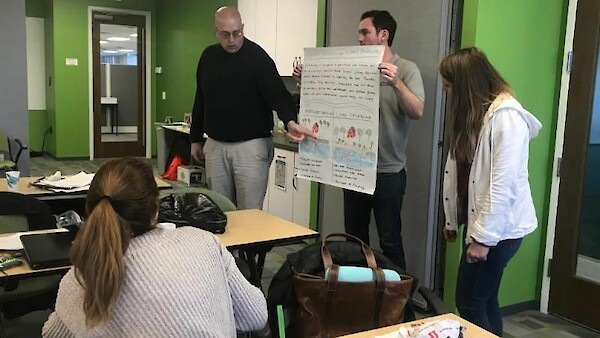
Richmond, Viginia and Carlisle, Pennsylvania, USA. The CMC trained approximately 20 people in Data Interpretation and Science Communication in February. The free 2-day workshop is part of the CMC's training services and include hands-on, immersive training in data interpretation, conceptualization, storytelling, and design and layout. One workshop was hosted at the Virginia Department of Environmental Quality's office in Richmond, VA and the other was hosted by the Alliance for Aquatic Resource Monitoring at Dickinson College in Carlisle, PA. The participants were asked to bring a spreadsheet of their data, as well as an idea for a science communication product that they could work on developing throughout the two-day course. There were a lot of impressive results from both workshops! Check out this blog for a more in-depth look!
Raleigh, North Carolina

Caroline Donovan, Alexandra Fries, and Suzi Spitzer attended the 2019 Citizen Science Association Conference last month. Caroline facilitated a roundtable discussion about the Chesapeake Monitoring Cooperative. Suzi gave a talk about the Citizen Scientist Submerged Aquatic Vegetation Monitoring Protocol. Alexandra led a workshop on best practices in science communication. There was a screening of the short film, Backyard Wilderness, which was a cool thing to do as part of the conference
New release: 2012-2017 Everglades Report Card
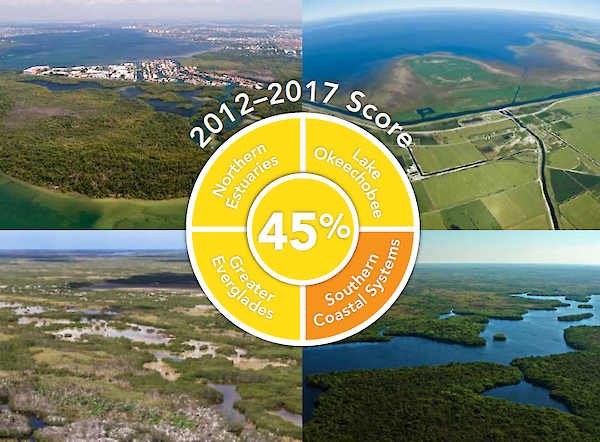
South Florida, USA. The Everglades Report Card and 2019 System Status Report, and associated website were released on April 23, 2019. These products are the culmination of two years or work and participation by dozens of stakeholders. The project wouldn't have been possible without the REstoration COordination and VERification program (RECOVER), that includes the U.S. Army Corps of Engineers, the South Florida Water Management District, and other Florida state agencies, federal agencies, and tribes. With a score of 45, out of a possible 100, the report card assesses overall Everglades ecological health as fair for the five-year period 2012–2017. For more information visit: evergladesecohealth.org.
New release: Drought in the U.S.- Affiliated Pacific Islands
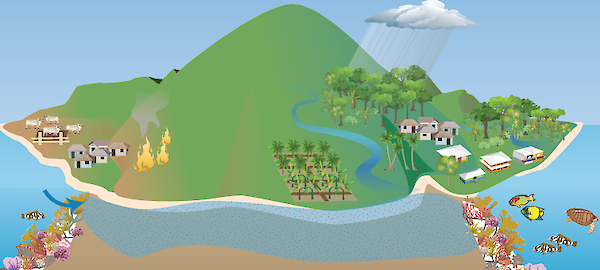
US Affiliated Pacific Islands. In 2015, IAN began a national-scale effort with the USGS National Climate Adaptation Science Center (NCASC) to synthesize the impacts of ecological drought across the country. Workshops were held at each of the nation’s eight regional Climate Adaptation Science Centers covering the following regions: Alaska, Pacific Islands, Northwest, Southwest, North Central, South Central, Northeast, and Southeast. During the Pacific Islands workshop in March 2017 in Honolulu, Hawaii, it became clear that the high islands of the Hawaiian archipelago were not representative of the diverse U.S.-Affiliated Pacific islands (USAPI), and so a ninth workshop was planned to capture aspects of drought in the islands. This newsletter highlights the outcomes of a two-day workshop held in Honolulu, focusing on past, current, and future impacts of drought throughout the USAPI.
NOAA Coral Reefs, USA
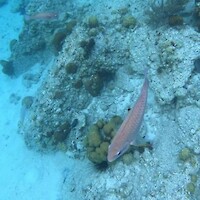
Between May and June 2019, IAN facilitated four workshops for NOAA's National Coral Reef Monitoring Program (NCRMP). IAN worked with NOAA scientists and local stakeholders to collect data for a series of upcoming status reports that will inform the public about the health of U.S. corals in the Atlantic.
Chesapeake Bay Report Card education
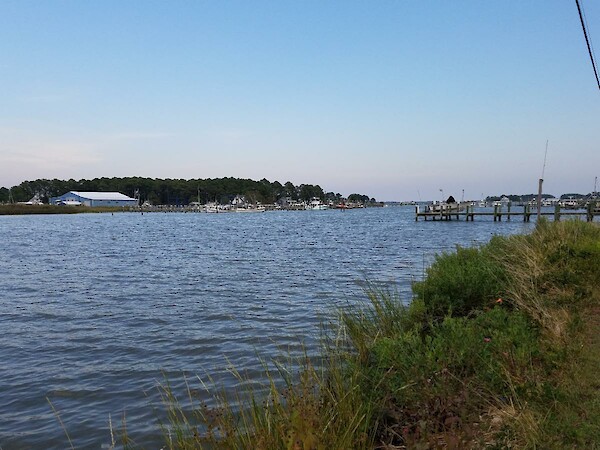
Caroline Donovan presented on the 2018 Chesapeake Bay report card to participants in the LEAD Maryland Fellowship Program, a two-year curriculum that increases the numbers and capacity of leaders serving agriculture, natural resources, and rural communities. The theme of the day was Water Resources and topics included hemp farming, oyster aquaculture, and the report card. It was also a welcome walk down memory lane for Caroline, who lived in Dorchester County during her graduate studies at Horn Point Laboratory.
November: IAN Report Card workshop at the Chesapeake Watershed Forum

This year's Chesapeake Watershed Forum, hosted by the Alliance for the Chesapeake Bay in West Virginia, will feature a workshop led by IAN staff entitled: "Expanding the Chesapeake Bay Report Card."
Atlantic Coral Reef Status Reports
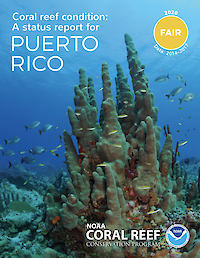
Separate reports were published for each U.S. Atlantic reef: Florida, Flower Garden Banks, Puerto Rico, and U.S. Virgin Islands. Reef status ranged from good to impaired.
National Coral Report

Years in the making, Coral reef condition: a status report for U.S. Coral Reefs synthesizes data to determine the health of Pacific and Atlantic coral reefs. Nine jurisdiction-specific coral status reports were published prior to this national report. For more information, visit the Coral Reef Information System or our reef project page.
Annual Chesapeake Watershed Forum in Shepherdstown, WV.
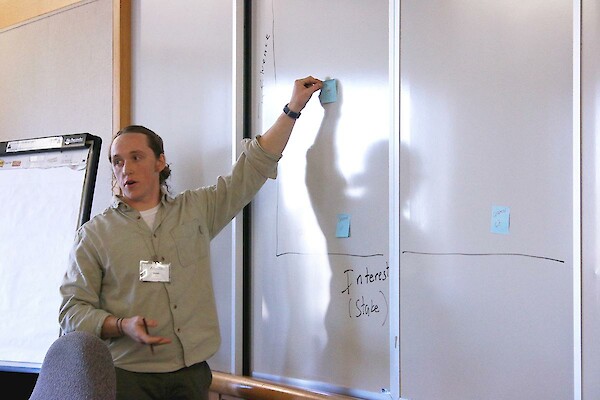
IAN was well represented at this year's Chesapeake Watershed Forum. Caroline Donovan, Dylan Taillie, Sky Swanson, Suzi Spitzer, and Nathan Miller presented on IAN-led or IAN-supported initiatives throughout the Chesapeake Watershed. Suzi and Dylan presented posters on their respective graduate research; Nathan presented during a Chesapeake Monitoring Cooperative session about data management and interpretation; and Caroline, Dylan, and Sky hosted a session working with stakeholders for the UMCES Chesapeake Bay Report Card to expand the report card with social, cultural, and economic indicators.
CERF Conference in Mobile, Alabama
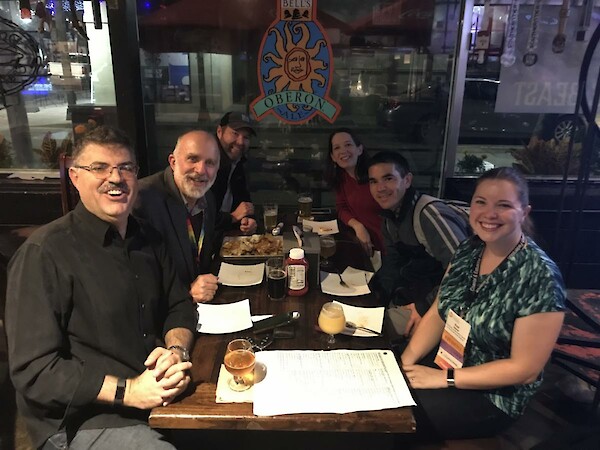
Multiple IAN scientists presented at the week-long 2019 Coastal and Estuarine Research Federation conference in Mobile, Alabama. Staff chaired several sessions on topics including coastal environmental management, citizen science, and seagrasses. IAN also led two conference workshops on science communication and data synthesis. Presenters included Bill, Heath, Caroline, Katie May, Vanessa, and Suzi. In addition, IAN staff attended the UMCES reunion and manned the UMCES booth, participating in the UMCES selfie contest and survey (see the results here!).
Fact sheet on nutrient trends in the Chesapeake now available
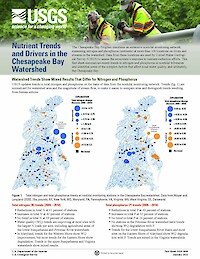
The US Geological Survey and IAN have collaborated to release a one-page fact sheet, Nutrient Trends and Drives in the Chesapeake Bay. The fact sheet quantifies trends and drivers in nutrient loading throughout the Chesapeake Bay Watershed and provides visualizations. This will help high-level managers and policymakers understand the complex processed that drive water quality, informing efforts to have nutrient reduction practices in place by 2025. You can view the full fact sheet here, or check out our short videos (Part 1, Part 2) that explain the main findings.
The CMC reflects on its first six years

The Chesapeake Monitoring Cooperative (CMC) is completing its sixth year. Together we have built a monitoring network, helped numerous groups start new monitoring programs, and incorporated over 300,000 data points into the Chesapeake Data Explorer. A summary report highlights the amazing partnerships, collaborations, and accomplishments that we have been a part of for the last six years.
U.S. Coral Reefs are in fair condition, but vulnerable to further decline
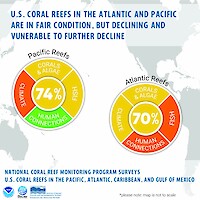
On November 10th, IAN held a press event with NOAA'S Coral Reef Conservation Program to launch the national coral reef status report. Years in the making, Coral reef condition: a status report for U.S. Coral Reefs synthesizes data from four categories (corals & algae, fish, climate, and human connections) to determine the health of Pacific and Atlantic coral reefs. The report is designed to be accessible for the general public and policy makers, utilizing color-rich visuals and descriptive text. Nine jurisdiction-specific coral status reports were published prior to this national report. For more information, visit the Coral Reef Information System or our reef project page.
The Hack-the-Bay Hackathon was a success
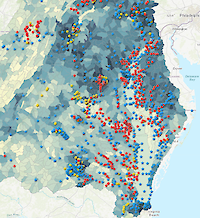
Hack the Bay, a hackathon led by Booz Allen Hamilton in partnership with the Chesapeake Monitoring Cooperative, was a rousing success! Participants represented skills, positions, and levels of expertise across data science, web development, and human-centered design. The hackathon helps the CMC reach its goals of analyzing and visualizing monitoring data. The incredible value of this previously unanalyzed, nontraditional water quality data was explored through four challenges. Four winning projects were selected as the top solutions in their categories and were showcased to a virtual audience. You can view all the hackathon entries and winners here.
HAPPENING NOW: Hack the Bay
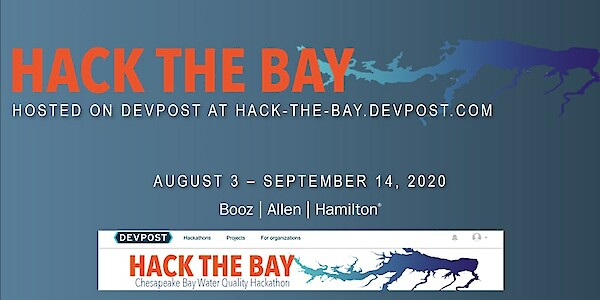
In celebration of the 50-year anniversary of Earth Day, Booz Allen Hamilton, Inc. (Booz Allen) has partnered with the Chesapeake Monitoring Cooperative (CMC) to host a social good hackathon to explore data monitoring the health of the watershed. From August 3–September 14, data scientists, developers, designers, problem solvers, and storytellers are invited to explore CMC's data and create solutions to address some of their core challenges. Registration is still open. Learn more about the event and sign up here!
Chesapeake Bay Watershed Report Card released!
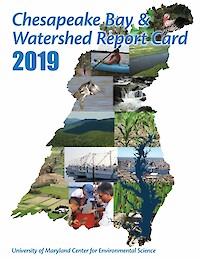
On May 19th, Chesapeake Bay Watershed Report Card was released during a virtual event. Speakers included Dr. Peter Goodwin, Dr. Bill Dennison, Secretary Ben Grumbles, Secretary Matthew J. Strickler, Ann Swanson, Kate Fritz, Jake Reilly, and Secretary Jeannie Haddaway-Riccio. For the first time, Chesapeake Bay watershed health was scored as part of the report card and scored a B- grade. The Chesapeake Bay health score decreased in 2019, dropping from a grade of C to a C-. In addition to ecological indicators, societal indicators were included for the first time. There were over 90 people watching the live webinar event, and 95 million people were reached through traditional and social media. You can view the full report card document here or visit the report card website here.
The Chesapeake Bay Report Card will include new watershed indicators
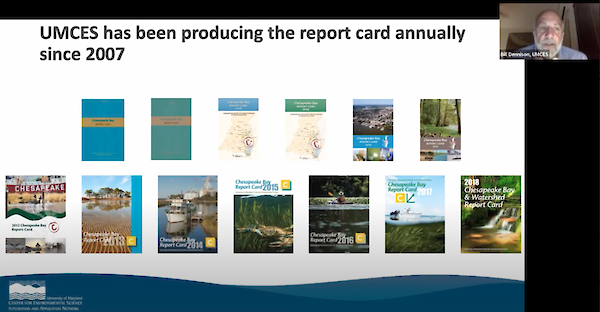
As part of the revisions to the Chesapeake Bay Report Card this year, IAN hosted a two-hour webinar for stakeholders to consider the proposed indicators that were in development. The workshop was very well-attended by stakeholders from all over the watershed. Through a lively discussion by video conference, and through the use of the chat function, stakeholders generated great feedback and recommendations on how to proceed. This year, the Chesapeake Bay Report Card will unveil additional indicators that assess the health of the watershed, for the first time in its 14-year history. The report card will be released on May 19. Stay tuned!
Facilitating a virtual Subject Matter Expert workshop
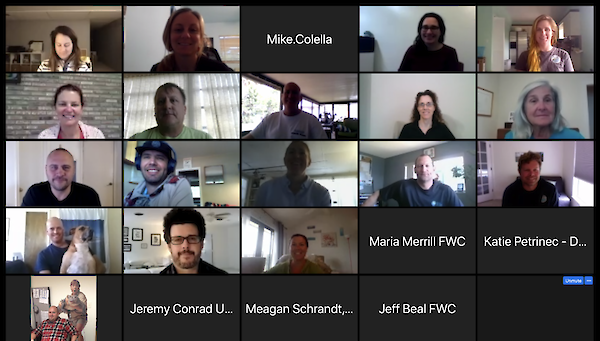
SEACAR is an ongoing project between IAN and the Florida Department of Environmental Protection. At this point in the project, it was necessary to run a workshop for the subject matter expert team to review the results of preliminary assessment analyses. Ideally, a 2-day meeting with this much material to cover, and which involves 45+ participants, would be conducted in person. Given the circumstances, IAN hosted and facilitated the full workshop virtually—and it was a success! The SEACAR team has a clear path forward and participants felt the workshop accomplished its goals.
Preparing for the Rivanna Report Card
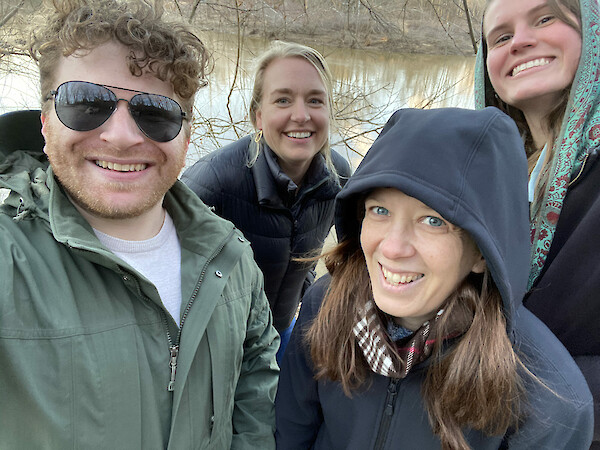
Caroline Donovan and Nathan Miller met with Rivanna Conservation Alliance staff members in Charlottesville, VA for a report card workshop. The creation of highly engaging and data-driven communications products are key to the Rivanna Conservation Alliance's mission to inform the public about regional water quality and macroinvertebrate populations, using years of data from over 50 monitoring stations. Workshop attendees reviewed the process of data analysis for report cards as well as design and content strategies. Stay tuned for more information!
Teaching science communication to Chesapeake Research Consortium staff
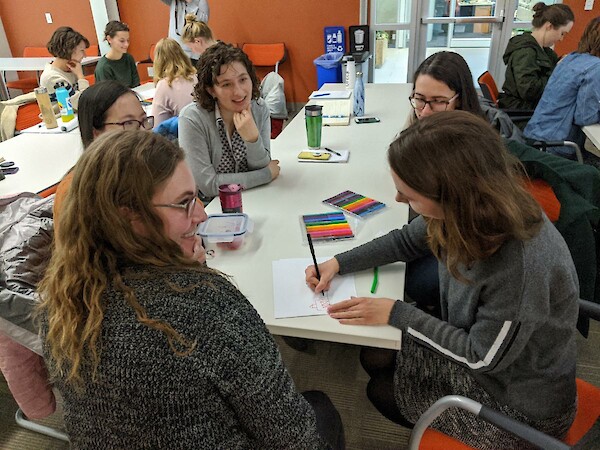
Caroline Donovan and Katie May Laumann taught IAN's "Communicating Science Effectively" course to Chesapeake Research Consortium Staffers. The course was taught at the beautiful Smithsonian Environmental Research Center, where Staffers learned about all aspects of science communication, from product conceptualization to the visualization of scientific information. Participants built their communication skills through various activities, and ultimately drafted and were given feedback on posters communicating their own scientific work.
Facilitating the first SEACAR workshop
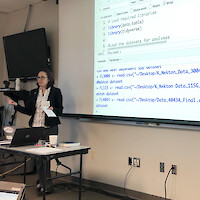
Caroline Donovan, Katie May Laumann, and Emily Nastase traveled to St. Petersburg, FL to facilitate the first Subject Matter Expert workshop for the Statewide Ecosystem Assessment of Coastal and Aquatic Resources (SEACAR) program. More than 40 Subject Matter Experts convened for this two-day meeting, and together made significant progress toward SEACAR's objectives. The second SEACAR workshop is scheduled for April 2020, where preliminary analyses will be reviewed. The final SEACAR technical and assessment reports are expected to be completed in summer 2020.
Chesapeake and Coastal Service Innovative Technology Fund announcing new projects soon

Developing new technologies, industries, and processes is critical for the Chesapeake Bay restoration effort. Maryland's Innovative Technology Fund aims to reduce non-point source sectors; support business development while creating and retaining green jobs in Maryland; and to ensure the State is on the cusp of the most cost-effective and efficient technologies. Renewable energy, energy efficiency, natural filters, urban stormwater, and agricultural water quality improvements are all eligible projects.
Revamping the Chesapeake Bay Report Card
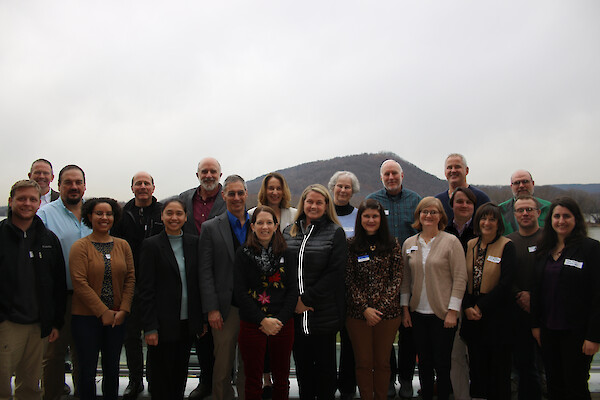
From January 7–8, IAN staff traveled to Harrisburg, PA for a workshop to expand the Chesapeake Bay Report Card. Bill, Caroline, Alex, Sky, and Vanessa facilitated and presented at the workshop. The workshop brought together stakeholders to discuss how to include watershed and socioeconomic data in future report cards. Watershed reporting regions were developed and numerous new indicators were discussed. Moving forward, there will be another workshop held in Virginia this spring to further refine the indicators and data analysis methodology.
2018 Chesapeake Bay Report Card
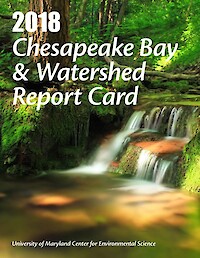
We compiled and created the annual health score for the Chesapeake Bay. This year's report card added indicators as well as scoring the Bay itself, which received a score of 45% (C) in 2018.
A successful, virtual National Monitoring Conference

The CMC project team attended the virtual National Monitoring Conference in April. The one-week virtual event brought together practitioners from federal, state, and volunteer monitoring organizations to share knowledge about monitoring across the U.S. The CMC presented on the Hack the Bay and provided a Data Interpretation workshop at the conference. The image (above) is from the panel discussion in the session “Building Credibility in Community-based Monitoring Programs,” with Julie Vastine from ALLARM facilitating the discussion and Liz Chudoba, the CMC Project Manager, presenting on the CMC Hackathon.
14th International Coral Reef Symposium held virtually last month
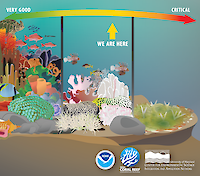
The 14th International Coral Reef Symposium was held virtually from July 19 to 23, 2021. This virtual conference took place instead of the in-person conference in 2020. ICRS is the most important coral reef conference in the world. It usually only occurs once every four years and draw experts from all around the globe. During the virtual coral reef conference last month, Heath Kelsey and Caroline Donovan, along with our colleague Erica Towle (NOAA Coral Reef Conservation Program) presented our work on coral reef status reports, which evaluated the health of coral reefs in nine individual U.S. jurisdictions and overall (nationally). It was great to "see" some of the other partners from this project presenting during the conference as well.